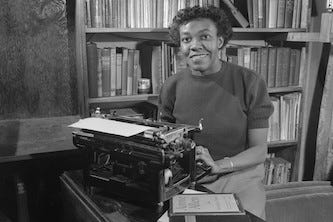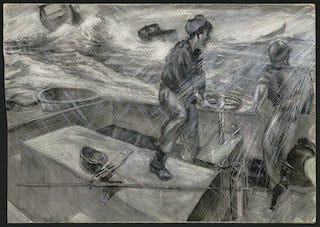The Weird Times: Issue 56, June 6 2021 (V2 #4)
The local is objective. The gaze from inside the critical zone is completely objective, it is just objective in a different way. What we see is real, but this reality only becomes visible if we learn what different parties are up to, what they need, what they want, what they can accomplish. —Bruno Latour
What becomes clear is that a technologically enabled, consumerist approach to environmental crises will not work. —Johanna Drucker
Gwendolyn Brooks, June 7, 1917 – December 3, 2000
There is a moment in Camaraderie
when interruption is not to be understood.
I cannot bear an interruption.
This is the shining joy;
the time of not-to-end.
—from “An Aspect of Love, Alive in the Ice and Fire,” in Blacks, Third World Press.
Frances Ethel Gumm; June 10, 1922 – June 22, 1969
You have a lifetime before you.
I'll adore you, come what may.
Please don't be blue for the present,
When it's so pleasant to hear you say
I can't give you anything but love, baby.
That's the only thing I've plenty of, baby.
-I Can’t Give You Anything but Love, Dorothy Fields/Jimmy McHugh
D-Day, June 6, 1944: more than 160,000 Allied troops landed on the beaches of Normandy, France. Today I am thinking of Tracy Sugarman, 23-year-old ensign in command of an LST in the first wave of the invasion. He was an artist all his life, his illustrations of that day are in his book, My War: A Love Story in Letters and Drawings, that collected his letters and drawings sent home to his wife, June. I miss you, Tracy.
A gallery of his WWII drawings and paintings here at the Library of Congress.
The Detroit Stars’ pitcher Bill Gatewood, threw the first Negro National League no-hitter 100 years ago today, June 6, 1921, beating the Cincinnati Cubans. “Big Bill” was a 6-foot-7 spitballer from San Antonio, Texas. After he was done playing baseball, he went on to manage the St. Louis Stars and the Birmingham Black Barons.
Trump tried to use the Department of Justice to try to overturn the results of the 2020 election. Five emails provided to Congress show Trump’s chief of staff, Mark Meadows, asking the acting attorney general, Jeffrey A. Rosen, in December, to investigate rumors of voter fraud. One of the fantastical stories Meadows wanted investigated was the story that “people in Italy had used military technology and satellites to remotely tamper with voting machines in the United States and switch votes for Mr. Trump to votes for Joseph R. Biden Jr.”
The Department of Justice is not the president’s to command. It is supposed to enforce the laws of the United States and administer justice. The office of the president has its own lawyer—the White House counsel—and the president can also have their own personal representation. That Trump tried to use our own Department of Justice to overturn the will of the American voters is eye-popping. — Heather Cox Richardson, Letters from an American, 6/5/21
The Threats to American Democracy and the Need for National Voting and Election Administration Standards, New America, 6/1/21
We, the undersigned, are scholars of democracy who have watched the recent deterioration of U.S. elections and liberal democracy with growing alarm. Specifically, we have watched with deep concern as Republican-led state legislatures across the country have in recent months proposed or implemented what we consider radical changes to core electoral procedures in response to unproven and intentionally destructive allegations of a stolen election. Collectively, these initiatives are transforming several states into political systems that no longer meet the minimum conditions for free and fair elections. Hence, our entire democracy is now at risk.
When democracy breaks down, it typically takes many years, often decades, to reverse the downward spiral. In the process, violence and corruption typically flourish, and talent and wealth flee to more stable countries, undermining national prosperity. It is not just our venerated institutions and norms that are at risk—it is our future national standing, strength, and ability to compete globally.
Statutory changes in large key electoral battleground states are dangerously politicizing the process of electoral administration, with Republican-controlled legislatures giving themselves the power to override electoral outcomes on unproven allegations should Democrats win more votes. They are seeking to restrict access to the ballot, the most basic principle underlying the right of all adult American citizens to participate in our democracy. They are also putting in place criminal sentences and fines meant to intimidate and scare away poll workers and nonpartisan administrators. State legislatures have advanced initiatives that curtail voting methods now preferred by Democratic-leaning constituencies, such as early voting and mail voting. Republican lawmakers have openly talked about ensuring the “purity” and “quality” of the vote, echoing arguments widely used across the Jim Crow South as reasons for restricting the Black vote……
We urge members of Congress to do whatever is necessary—including suspending the filibuster—in order to pass national voting and election administration standards that both guarantee the vote to all Americans equally, and prevent state legislatures from manipulating the rules in order to manufacture the result they want. Our democracy is fundamentally at stake. History will judge what we do at this moment.
PLEASE READ - AND SHARE!
Electric Avenue
Amsterdam tests out electric autonomous boats on its canals, Aleksandar Furtula, Mike Corder, AP, 6/3/21
Electric cars, meet your competition. Electric boats are on the way.
Amsterdam didn’t have to look very far when searching for a way to ease traffic on its congested streets. The Dutch capital’s canals were used for transport long before cars and trucks powered by polluting internal combustion engines began clogging its narrow roads.
Already steeped in maritime history, the city’s more than 100 kilometers (60 miles) of waterways are to start hosting prototypes of futuristic boats — small, fully-autonomous electric vessels — to carry out tasks including transporting passengers and picking up garbage.
The Amsterdam Institute for Advanced Metropolitan Solutions and the Massachusetts Institute of Technology are collaborating on the Roboat project that aims to develop new ways of navigating the world’s waterways without a human hand at the wheel.
Albertsons Cos. Accomplishes a Grocery Industry First, Retail Best Practices, Retailandhospitalityhub.com, 6/1/21
It happened on May 28, and it’s being called the country’s first zero-emission commercial grocery delivery by a Class 8 truck ever.
It originated at an Albertsons Cos.’ distribution center in Irvine, Calif., where a refrigerated electric semi-trailer truck was loaded up and sent on its way for delivery.
Boise, Idaho-based Albertsons Cos. is one of the largest grocery chains in the U.S. and operates stores across 34 states and the District of Columbia under more than 20 banners including Albertsons, Safeway, Vons, Pavilions, Randalls, Tom Thumb, Carrs, Jewel-Osco and others. The company recently purchased two Volvo VNR electric trucks for its Irvine distribution center. The VNR electric models from Volvo Trucks North America are the first zero tailpipe emission, battery-electric Class 8 trucks to be deployed in Albertsons Cos. company-wide fleet, and will service Albertsons, Vons and Pavilions stores in Southern California.
Solar windows, shingles and cladding? The building itself is now the solar panel: Canadian companies are starting to make transparent, coloured panels designed to protect the building, Emily Chung, CBC News, 6/2/21
When you walk through the sun-filled atrium of the Edmonton Convention Centre or glimpse the dramatic sloped roof of the Varennes Library in suburban Montreal, it's not obvious these buildings are generating power. After all, neither has traditional solar panels tacked on the roof.
But the semi-transparent skylights of the atrium and the shingles on the sloped roof are more than just protection from the elements — they're building-integrated photovoltaics (BIPV). That is, they're made of solar panels.
It's a solution touted by Elon Musk, CEO of Tesla, which started selling solar roof tiles in the U.S. in 2017. Since then, a range of made-in-Canada options for different parts of buildings have hit the market — and installations have sprung up across the country showcasing what's possible.
The Future of Classic Porsches and Jaguars? Electrification: Owners of vintage sports cars and hot rods are giving them a second life by installing recycled Tesla powertrains, Dan Neil, Wall Street Journal, 6/5/21
Gasoline-to-EV conversions are not new. I met a JPL scientist in Pasadena, Calif., who had done the same to his MG British sports car in 1965, using lead-acid batteries. Facebook and the website EValbum.com document decades of such projects, from mild to wild, mowers to dragsters, by over-functioning DIY Quixotes.
What is new is everything else, in bulk, starting with the cargo ships of automotive-grade lithium battery packs, high-torque motors, inverters, battery-management systems and controllers now readily available to privateers—much of it being exported from China, the spindrift from that country’s tidal wave of electrification.
As electric vehicles take off, we'll need to recycle their batteries: Electric car batteries contain critical minerals like cobalt and lithium. We’ll need to recycle them unless we want to keep mining the earth for new ones, Madeleine Stone, National Geographic, 5/28/21
All the birdies in the sky

Birds Are Declining in a Supposedly ‘Untouched’ Region of Amazon Rainforest: Bird numbers and diversity are dropping even within the best-protected forests, study finds. The scientists' only explanation is climate change., Maria Paulo Rubiano A, Audubon, 6/2/21
In 2008, Philip Stouffer found himself befuddled in the middle of the Amazon rainforest. It had been nearly 20 years since his first visit to the Biological Dynamics of Forest Fragments Project (BDFFP), a long-term study of rainforest fragmentation based at a protected 37,000-acre portion of the Brazilian forest about 50 miles north of the city of Manaus. His surroundings were as lush as as they had always been, and old, tall trees testified to the ecosystem’s good health. Like in previous visits, he expected to spot some of the Amazon’s most elusive birds. But that wasn’t the case. “Rare birds were harder to find than we anticipated,” Stouffer, a Louisiana State University biologist, says. He spent the next eight years trying to confirm his observation that the area's birdlife had changed and to explain why it was happening.
Mockingbirds follow similar musical rules as those found in human music, Max-Planck-Gesellschaft, Science Daily, 6/3/21
The North American mockingbird is famous for its ability to imitate the song of other birds. But it doesn't just mimic its kindred species, it actually composes its own songs based on other birds' melodies. An interdisciplinary research team has now worked out how exactly the mockingbird constructs its imitations. The scientists determined that the birds follow similar musical rules as those found in human music, from Beethoven to Kendrick Lamar.
A Day With New York’s Bird Paramedics: During migration, tens of thousands of birds crash into our skyscrapers. A few volunteer EMTs rush in to help, Victoria Beliempis, Curbed, 5/28/21
New York City sits on the Atlantic Flyway, the broad corridor where birds travel from Central or South America to breeding grounds as far north as the Arctic Circle. Many migratory species, including the majority of songbirds, travel at night, and bright lights and glass buildings attract and then disorient them with reflections of greenery or sky. When they strike a window at full speed, they knock themselves unconscious and fall. New York City Audubon estimates that 90,000 to 230,000 migratory birds die in New York City every year from building collisions….
The volunteers working on Project Safe Flight do not merely collect individual dazed birds — they aim to quantify the extent of this problem. They log deaths and injuries into a New York City Audubon database called dBird. Their collected data help conservationists estimate overall collision deaths in New York City and identify problem hot spots. In doing so, they can approach buildings and policy-makers about enacting mitigation techniques.
The Land and the People on It
Native American tribe in Maine buys back island taken 160 years ago: The Passamaquoddy’s purchase of Pine Island for $355,000 is the latest in a series of successful ‘land back’ campaigns for indigenous people in the US, Alice Hutton, The Guardian, 6/4/21
Donald Soctomah, the tribe’s historic preservation officer, added: “Our concept of land ownership is that nobody ‘owns’ land. Instead, we have a sacred duty to protect it. This is like finding a lost relative.”
The reclaiming of Pine Island is the latest successful “land back” attempt by US indigenous groups following the loss of 1.5bn acres since 1776, resulting in poverty, violence and cultural apartheid.
In July last year, the formerly landless Esselen tribe purchased 1,200 acres in California’s Big Sur for $4.5m, also donated by conservationists, 250 years after being forced into Christian missions.
In 2019, the Wiyot tribe won back the 280-acre Duluwat Island in California, when the city of Eureka returned it for free, 159 years after a massacre.
Cities have unique microbiomes which could be key to keeping us healthy: Researchers swabbed city buses and subways and found DNA from viruses and bacteria that had never been classified before, Ellie Schechet, Popular Science, 6/2/21
When the world gets lonely, just remember: We are all marinating in a shared vat of microbial life. That’s a good thing, for the most part. You might have heard of the human gut microbiome, the community of tiny organisms in our digestive tract that can influence our health in still-mysterious ways, but cities have microbiomes, too—and a recent study suggests that they’re actually unique, ranging in composition from city to city.
The study, published on May 26 in the journal Cell, mapped out microbial communities in 60 cities across six continents, analyzing over 4,700 samples taken from subways and bus systems to get a sense of the bacteria, viruses, and archaea that live there. “What we knew before is that there were definitely thousands of species awaiting us at every turnstile and bench,” says lead author Chris Mason, an associate professor at Weill Cornell Medicine in New York. “But we didn’t have a sense of how different these microbiomes are between cities.”
An international team of researchers swabbed ticket kiosks, railings, seats, turnstiles, and other heavily-touched surfaces in the mass transit systems of cities around the world, including Bogotá, New York City, and Tokyo, over a period of three years. The researchers found a consistent group of 31 “core” species found in nearly all sites, including species like Cutibacterium acnes, a common bacterial species that lives on human skin. But they also found that microbial communities had distinct compositions, or “signatures,” in different cities.
Uh-Oh – We are Living on the Edge
Hurricane season kicks off. Expect higher-than-normal storm activity: The season is expected to bring about 13 to 20 named storms, Yasemin Saplakoglu, LiveScience, 6/3/21
World leaders ‘ignoring’ role of destruction of nature in causing pandemics: Ending the destruction of nature to stop outbreaks at source is more effective and cheaper than responding to them, scientists say, Damian Carrington, The Guardian, 6/4/21
Study suggests pollution plays an outsized role in western Pennsylvania cancer rates: Researchers estimate that if everyone in Allegheny County had quit smoking 20 years ago, lung cancer rates would only be 11% lower. Among 612 other U.S. counties, lung cancer rates would have declined an average of 62%, Kristina Marusic, Environmental Health News, 6/4/21
How Pesticides Are Harming Soil Ecosystems: At a time when interest in regenerative agriculture is growing, a new study looks at the way pesticides can devastate soil species that foster plant health and sequester carbon, Meg Wilcox, Civil Eats, 6/4/21
Amid Dire Colorado River Outlook, States Plan to Tap Their Lake Mead Savings Accounts: This year and next, Arizona and California intend to draw on water they banked in the big reservoir, even as water levels drop, Brett Walton, Circle of Blue, 6/2/21
‘There are ghosts in the land’: how US mega-dairies are killing off small farms: A collapse in the number of dairy farmers in states such as Minnesota is destroying livelihoods and hollowing out rural life, Debbie Weingarten, The Guardian, 6/1/21
On the Other Hand
‘High on the Hog’ Celebrates Black Contributions to Global Food and Culture: Stephen Satterfield, the host of the new Netflix docuseries, shares his experience participating in a screen adaptation of Dr. Jessica B. Harris’s work, the power of film to shift and reclaim narratives, and the beauty and joy of the African food diaspora, Nadra Little, Civil Eats, 5/26/21
The key to averting environmental catastrophe is right beneath our feet, Claire Asher, MongaBay, 6/1/21
The human genome has finally been completely sequenced after 20 years, Michael Marshall, NewScientist, 5/28/21
30,000 milkweeds planted around California in effort to save Western monarch butterfly, Tara Duggan, SF Chronicle, 5/31/21
An Australian inventor wants to stop global warming by electrifying everything, Rachel Pannett, Washington Post, 5/28/21
Scientists reprogrammed bacteria to be immune to viruses, Nicoletta Lanese, LiveScience, 6/3/21
The Everglades are dying. An alliance between Biden and Republicans could save them, Francisco Alvarado, The Guardian, 6/3/21
At the Duwamish Longhouse, A Law Is Signed Requiring Environmental Justice From State Agencies, Jack Russillo/South Seattle Emerald, Investigate West, 6/2/21
Ross Benes' RURAL REBELLION: HOW NEBRASKA BECAME A REPUBLICAN STRONGHOLD is useful toward providing an understanding of the vast cultural/political/experiential rifts that divide America. Republican power brokers have recognized the benefit the unequal representation both the Senate and the Electoral College provide small population states and they have spent decades building a power base using that imbalance. All the culture wars and xenophobia they inspire are just tools in their arsenal, along with Faux News and a brilliantly deployed social media effort.
In the long run this will assuredly tear apart our democracy. When power is the only goal of a political party, it will willingly trade democratic principles for that power and control. They have read Lenin, we should too. I talked to Ross about the book in the latest episode at Writerscast.com.
Our garden is growing, and suddenly it feels like summer. It’s good to be with people again. I do hope that what we make out of our culture is not a new “normal,” but something better. We have alot of work to do. Best wishes to all. Write when you have time. Send news, send stories and poems, (bird photos!) and send love where it’s needed most.
I'm gonna find me a horse
Just about this big
An' ride him all along the border line
With a Pair of heavy-duty
Zircon-encrusted tweezers in my hand
Every other wrangler would say
I was mighty grand
By myself I wouldn't
Have no boss
But I'd be raisin' my lonely Dental Floss
—from “Montana” (c) Frank Zappa








